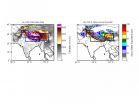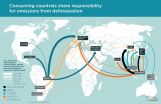(Press-News.org) Just in time for flu season, a new Michigan State University study of "the mother of all pandemics" could offer insight into infection control measures for the flu and other epidemic diseases.
Siddharth Chandra, director of MSU's Asian Studies Center and professor in MSU's James Madison College, and Eva Kassens-Noor, assistant professor of urban and transport planning with a joint appointment in the Global Urban Studies Program, studied the evolution of the 1918 influenza pandemic, aka the "Spanish flu." In 1918, the virus killed 50 million people worldwide, 10 to 20 million of whom were in India. In the United States alone, the Spanish flu claimed 675,000 lives in nine months.
"We need to pay more attention to public health," Chandra said. "If we get another flu pandemic and it infects tens of millions in the U.S., killing half a million people, that's going to be worse than anything that's happened to us in at least the last 50-to-100 years."
Chandra and Kassens-Noor studied weekly death rates in 213 districts from nine provinces in India, information contained in reports from the sanitary commissioner's office. According to their research, the virus entered India in Bombay, which experienced a three-week flu wave and a peak death rate of 54.9 people per 1,000. As it spread east, the flu epidemic lengthened to eight weeks and fewer people died.
Simply put: When the flu hit, it hit hard and fast.
"This has all sorts of implications for pandemics that are happening now or might be threatening to happen," Chandra said. "In scenarios resembling the 1918 pandemic as it unfolded in India, locations close to an entry point will have extremely short windows of time to deal with a virulent pathogen, placing emphasis on the emergency management of a short and severe wave of illness."
Possibly a severe wave like the Ebola virus in West Africa, he said.
According to the World Health Organization, there have been 9,216 confirmed, probable and suspected cases of Ebola in seven countries and 4,555 deaths. While Chandra acknowledges Ebola is far less contagious than the flu, and it's not moving as quickly, if there had been 9,000 cases of the 1918 flu, there would've been fewer than 900 deaths.
"One of the things this research could shed light on: Are viruses like the Ebola virus going to get less virulent or more virulent as they move on?" he said.
Economically, an epidemic of any sort would wreak havoc. Chandra, an economist, said that if the United States lost 1 million people, who produce an average of about $50,000 in gross domestic product each, the country would lose about $50 billion in productivity. Not to mention, the movement of goods and services could stop, as could public transportation, he said.
INFORMATION:
The study was published in the most recent edition of the journal BMC Infectious Diseases as an "Editor's Pick."
BOZEMAN, Mont. – A team of researchers including Montana State University professor Selena Ahmed has found that shifting patterns of precipitation affect key chemicals responsible for the flavor and health properties of tea.
Ahmed, assistant professor of health and human performance in the MSU College of Education, Health and Human Development, said the team's research shows that major antioxidant compounds that determine tea health properties and flavor, including epigallocatechin, epigallocatechin gallate, epicatechin gallate, gallocatechin gallate, catechin ...
Taking steps from an early age to improve childhood education skills could raise overall population levels of academic achievement by as much as 5%, and reduce socioeconomic inequality in education by 15%, according to international research led by the University of Adelaide.
In a study now published in the journal Child Development, researchers from the University of Adelaide's School of Population Health and colleagues at the University of Bristol in the UK have modelled the likely outcomes of interventions to improve academic skills in children up to school age. They ...
Philadelphia, Oct. 22, 2014 – New work by a pioneering scientist details how subtle changes in mitochondrial function may cause a broad range of common metabolic and degenerative diseases. Mitochondria are tiny energy-producing structures within our cells that contain their own DNA.
The new research shows that small changes in the ratio of mutant to normal mitochondrial DNA within the thousands of mitochondrial DNAs inside each cell can cause abrupt changes in the expression of numerous genes within the nuclear DNA. Furthermore, the different proportions of mutant ...
Using loan level data matched to consumer credit records, researchers have been able to determine that a reduction in mortgage payments of as little as $150 a month spurred a reduction in mortgage defaults and an increase in consumer spending (particularly the financing of automobile purchases), while improving household credit ratings.
University of Chicago Booth School of Business Professor Amit Seru, together with Benjamin J. Key of UChicago's Harris School of Public Policy, Tomasz Piskorski of the Columbia Business School and Vincent Yao of Fannie Mae authored "Mortgage ...
New Rochelle, NY, October 22, 2014—A panel of leading clinicians and researchers across various general and specialty pediatric fields developed a consensus statement recommending how to evaluate youngsters in whom neuropsychiatric symptoms suddenly develop, including the abrupt, dramatic onset of obsessive-compulsive disorder (OCD). This difficult diagnosis is typically made by pediatricians or other primary care clinicians and child psychiatrists, who will benefit from the guidance provided in the recommendations published in Journal of Child and Adolescent Psychopharmacology, ...
Researchers from Princeton University and other institutions may have hit upon an answer to a climate-change puzzle that has eluded scientists for years, and that could help understand the future availability of water for hundreds of millions of people.
In a phenomenon known as the "Karakoram anomaly," glaciers in the Karakoram mountains, a range within the Himalayas, have remained stable and even increased in mass while many glaciers nearby — and worldwide — have receded during the past 150 years, particularly in recent decades. Himalayan glaciers provide ...
International trade with agricultural and wood products is an increasingly important driver of tropical deforestation. More than a third of recent deforestation can be tied to production of beef, soy, palm oil and timber. "The trend is clear, the drivers of deforestation have been globalized and commercialized", says assistant professor Martin Persson, Chalmers University of Technology.
In a report commissioned by US think-tank Center for Global Development (CGD) Martin Persson and colleagues in Linköping, Sweden, and Vienna, Austria, have investigated to which extent ...
Major leaks from oil and gas pipelines have led to home evacuations, explosions, millions of dollars in lawsuit payouts and valuable natural resources escaping into the air, ground and water. But in a report in ACS' journal Industrial & Engineering Chemistry Research, scientists say they have developed a new software-based method that finds leaks even when they're small, which could help prevent serious incidents — and save money for customers and industry.
Gary Valtinson and Miguel Bagajewicz note that using pipelines to move oil, gas and even water from one place ...
Selver Demic and his colleagues from the Mercator Research Group have set out to find out more about the causes of depression. "Approx. 20 per cent of the population will suffer a de-pressive episode in the course of their lives," says Demic. "This cohort of 20 per cent includes people who will never again experience any problems after that one-time episode is over. The others, however, will suffer repeatedly or chronically under the disorder, despite taking appropriate medication. We want to use our model to explain the occurrence and recurrence rates."
Unfortunate ...
INDIANAPOLIS -- Indiana is at the forefront of providing mental health screening and services to juvenile offenders, but more efforts are needed to improve the services provided to detained youths, according to Indiana University School of Medicine research findings published in the October issue of the American Journal of Public Health.
"A Statewide Collaboration to Initiate Mental Health Screening and Assess Services for Indiana Detained Youths" reviewed 25,265 detention visits of 15,461 youths occurring in 2008 to 2011. The youths were incarcerated in 16 detention ...



